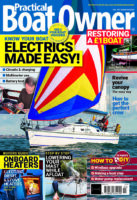Clipper race crewmember struggles with Atlantic divide...
Sailing is a great leveller. You can discover many things about your crewmates when confined to a small, wet yacht mid-ocean. But it seems that some on-shore differences are harder to shake off than you might expect.
American round the world crew member Quannon Au on board California in the Clipper 09-10 Round the World Yacht Race shares some tips from the American-flagged, mainly British-crewed entry…
“Don’t let the giant stars and stripes flag on the mainsail fool you. With our skipper and most crew either hailing from the UK or having a British background, we are definitely more a steak and chips than a burgers and fries boat, with just a few Americans onboard. Sometimes when I hear Pete call for the Yankee 3 to be brought on deck immediately, I wonder whether one of my fellow Americans has gotten in trouble with skipper, before realizing that he’s talking about one of the headsails.
Part of my ongoing training on this race, then, has been learning to navigate the subtle and not so subtle cultural differences. The following are my results thus far after many weeks of painstaking cultural anthropology. But don’t cry for me, Arkansas. If my work can help just one American coming onboard in a future leg then it will all have been worthwhile.
Tea: Where else would we start but with tea? Brits drink tea as much as Americans drink coffee. Actually, Brits drink tea as much as Americans drink any liquid. Whereas our franchise coffee shops foisted things like the “grande latte mochaccino with soy” on the rest of the world, on the boat you’re more likely to hear something like “tea, white, strong, 1 sweetener, extra milk.” Also, “tea” can apparently mean dinner. Or lunch. Which seems like it could lead to questions like “would you like some tea with your tea?”
Biscuits: What we call a biscuit, they call a bread roll. What we call a cookie, they call a biscuit. Crackers can be biscuits or crackers. But chocolate chip cookies are always cookies. Chocolate chip biscuits? Don’t be silly.
New and Exotic Foods: These may require some practice to get used to. Remember, your British crewmates have had their entire lives to get accustomed to the flavour. You have a lot of catching up to do. Dig in and add an extra helping of that Branston Pickle. Ask your crewmates about that jar of Marmite and they’ll tell you that many of them have eaten it from a very young age. They may also tell you that it’s a brown gooey substance left over from an industrial process.
Fascinating.
Repetitive Sauces: Peri peri sauce. Reggae reggae sauce. I haven’t yet seen “saucey sauce sauce” but it could be hidden somewhere in the galley. Asking for “brown brown sauce” or “mango mango chutney chutney” will only elicit strange looks, however.
Potatoes: Fries are called chips. Chips are called crisps. Jacket potatoes are what we call baked potatoes except, um, wearing cute little potato-sized biker jackets, I guess.
Manners. You may hear your crewmates ask for things using lots of extra words. Don’t be intimidated. This is called “being polite”, but being American no one will expect you to learn it. Just remember that “I couldn’t perhaps trouble you for a hot drink, could I?” translates roughly in American English to “Yo! Lemme get a coffee!”
Aluminum vs. Aluminium: Brits don’t know that we spell the word without the extra “I”. Don’t let them know this and instead insist that we pronounce it differently just to make them mad. Then watch as they get mad. Good clean fun every time.
Buoys: Brits prounounce this “boy” and find our pronunciation of “boo-ey” to be hilarious. See aluminium. Rinse and repeat.
Clothing: Pants are called trousers. Underwear is called pants. So saying “wow, my pants sure are dirty” may result in awkward silence. Followed by humiliating laughter.
Shortening words to make them more fun to say. Searching for a breakfast with chocolate biscuits? Do a “recky” on a “brekky” with some “chocky bickies”! If you’re a smoker you might even enjoy a “ciggy” afterwards. You can actually say these things.
Finally, if you’re a guy and someone accuses you of wearing a big girl’s blouse, well, you can probably guess that it’s not a good thing. British dudes don’t like wearing big girl’s blouses.”




